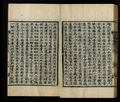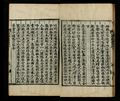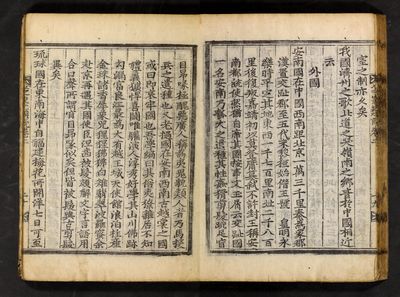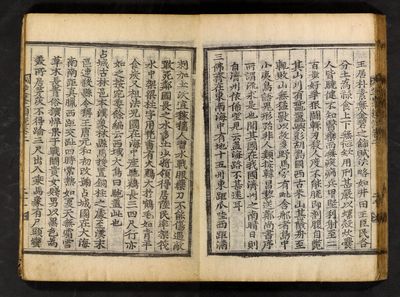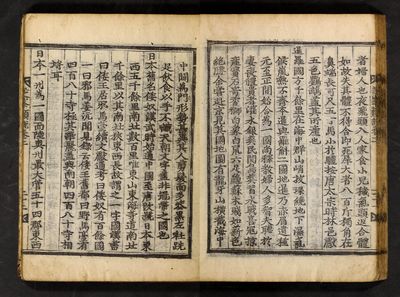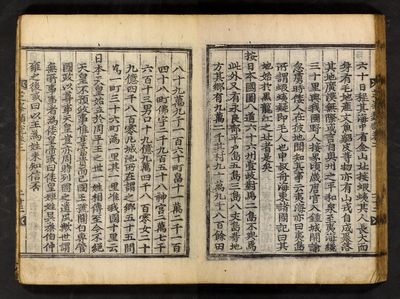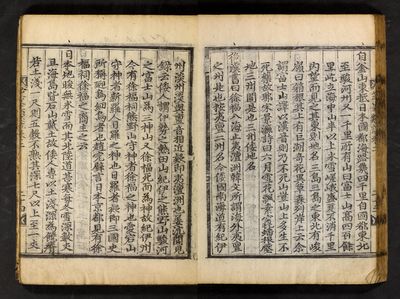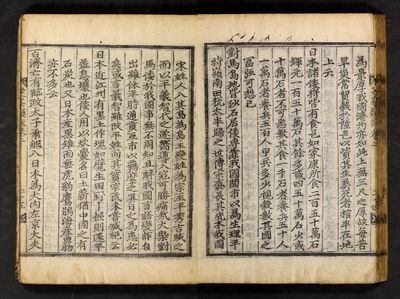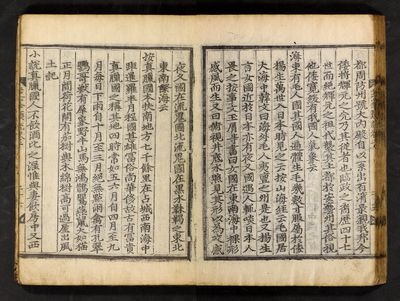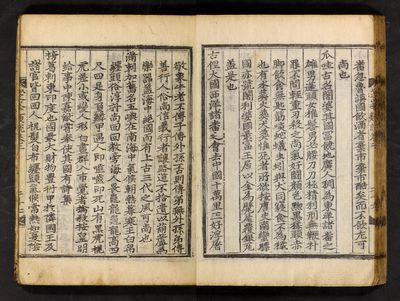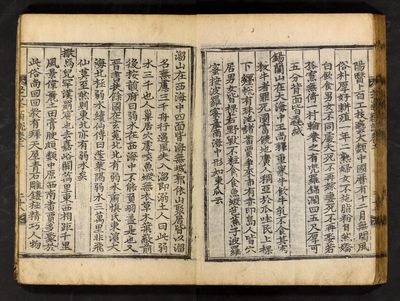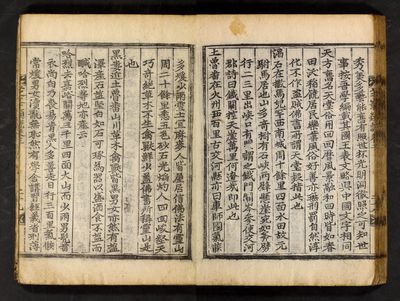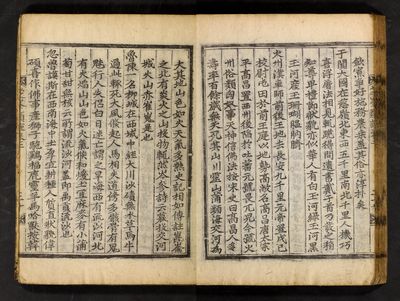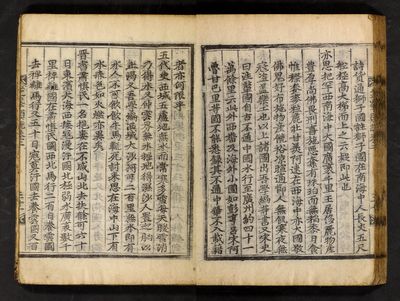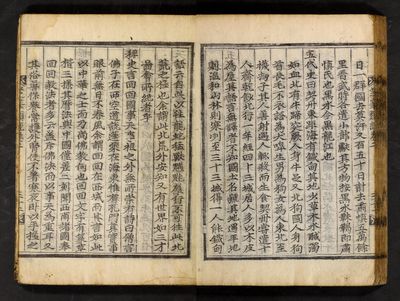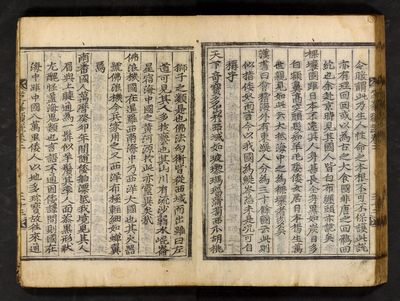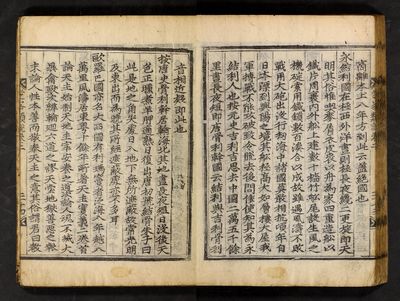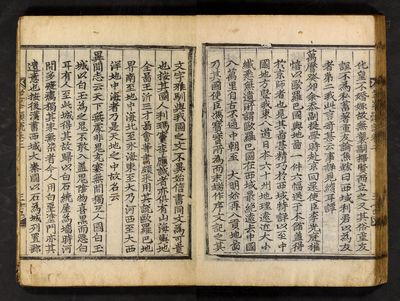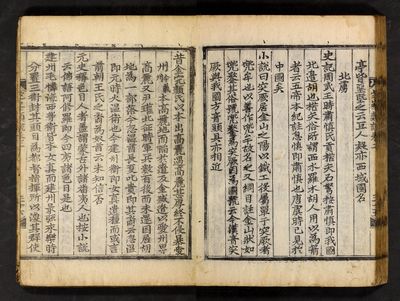"(Translation) 李睟光 外國"의 두 판 사이의 차이
장서각위키
(→Student 7 : King Kwong Wong) |
|||
| (사용자 14명의 중간 판 143개는 보이지 않습니다) | |||
| 3번째 줄: | 3번째 줄: | ||
|English = | |English = | ||
|Chinese = 芝峯類說 | |Chinese = 芝峯類說 | ||
| − | |Korean = 지봉유설(''Jibongyuseol'') | + | |Korean = [http://kostma.korea.ac.kr/viewer/viewerDes?uci=RIKS+CRMA+KSM-WZ.1614.0000-20090713.AS_BC_269&bookNum=&pageNum= 지봉유설(''Jibongyuseol'')] |
| − | |Genre = [[ | + | |Genre = [[Literati Writings]] |
|Type = | |Type = | ||
|Author = 李睟光 | |Author = 李睟光 | ||
| 15번째 줄: | 15번째 줄: | ||
}} | }} | ||
[[File:Backward.png|right|40px|link=2018 Summer Hanmun Workshop (Advanced)#Primary Sources for Korean Studies]] | [[File:Backward.png|right|40px|link=2018 Summer Hanmun Workshop (Advanced)#Primary Sources for Korean Studies]] | ||
| + | <gallery> | ||
| + | 파일:조완벽전2.jpg |link=(Translation) 李睟光 趙完璧傳|II-1-1. 趙完璧傳 조완벽전(''Jowanbyeokjeon'') | ||
| + | 파일:안남국사신창화문답록발.jpg|link=(Translation) 鄭士信 安南國使臣唱和問答錄 跋|II-1-2. 安南國使臣唱和問答錄 跋 안남국사신창화문답록 발(''Annamguksasinchanghwamundamnong Bal'') | ||
| + | </gallery> | ||
=='''Introduction'''== | =='''Introduction'''== | ||
| + | |||
| + | 自賣 was a prevalent method for the impoverished commoners to obtain subsistence in the extreme situation of famine during the late Choson period. This was called 口活’ | ||
| + | |||
| + | 한성부 향도꾼은 동내 주민 중심의 인적 구성을 벗어나 이웃 동내, 나아가 한성부 전체를 지역적 기반으로 하는 대형 조직으로 변모하였다 했다. 또한 노비의 입계를 허락하지 않는 가문은 계원들 다수가 그 집에 쳐들어가 쌍욕을 해대는가 하면 그 집 처녀를 보쌈을 해와 형제들끼리 나누어 가질 정도였다. 이같은 무리한 행위에도 불구하도 계원의 세력이 너무나 강해 항의조차 못할 정도였다. 향도계 계원들의 숫자는 많은 경우 수 백명에 달했고 적은 계일지라도 100 여명에 이르렀다. | ||
| + | |||
| + | 첫째, 그들의 상전 등 주위 양반들과 경제적 이해관계가 직접적이지 않았기 때문이었다. 주의 상전이나 양반들의 논밭을 경작하는 노비, 또는 하층민이라면 감히 토지소유주의 이해에 반하는 행위를 하지 못했을 것이다. 둘째, 익명성이 보장되고 회합이 용이한 도회지에서 활동했다는 점이다. 17세기 중엽 서울은 인구가 많을 뿐 아니라 유동 인구, 특히 도망 노비, 소작인들이 대거 이동함으로써 향도계원의 불법 혹은 도덕적 비난으로부터 일정부분 익명성을 보장받을 수 있었던 것이다. | ||
| + | |||
| + | connection with 중인. | ||
=='''Original Script'''== | =='''Original Script'''== | ||
| 23번째 줄: | 35번째 줄: | ||
{|class="wikitable" style="width:100%; background-color:#ffffff;" | {|class="wikitable" style="width:100%; background-color:#ffffff;" | ||
| − | !style="width:25%;"|Image || style="width: | + | !style="width:25%;"|Image || style="width:75%;"|Text |
|- | |- | ||
| [[File:지봉유설권2외국1.jpg |border|지봉유설권2외국1|400px]] | | [[File:지봉유설권2외국1.jpg |border|지봉유설권2외국1|400px]] | ||
| 31번째 줄: | 43번째 줄: | ||
2. 琉球國在東南海中。自福建梅花所開洋。七日可至。" | 2. 琉球國在東南海中。自福建梅花所開洋。七日可至。" | ||
| − | + | ||
| − | |||
|- | |- | ||
| [[File:지봉유설권2외국2.jpg |border|지봉유설권2외국2|400px]] | | [[File:지봉유설권2외국2.jpg |border|지봉유설권2외국2|400px]] | ||
| 41번째 줄: | 52번째 줄: | ||
4. 占城古林邑。本漢象林縣。馬援置銅柱之處。至漢末。區連殺縣令稱王。唐元和初。改號占城國。在大海南。南距眞臘。西距交趾。四時常熱如夏天。無霜雪。草木長靑。俗獷悍。果于戰鬪。貴女賤男。以黑色爲美。所居茅茨。不得踰三尺。出入乘馬象。有尸頭蠻" | 4. 占城古林邑。本漢象林縣。馬援置銅柱之處。至漢末。區連殺縣令稱王。唐元和初。改號占城國。在大海南。南距眞臘。西距交趾。四時常熱如夏天。無霜雪。草木長靑。俗獷悍。果于戰鬪。貴女賤男。以黑色爲美。所居茅茨。不得踰三尺。出入乘馬象。有尸頭蠻" | ||
| − | + | ||
| − | |||
|- | |- | ||
| [[File:지봉유설권2외국3.jpg |border|지봉유설권2외국3|400px]] | | [[File:지봉유설권2외국3.jpg |border|지봉유설권2외국3|400px]] | ||
| 53번째 줄: | 63번째 줄: | ||
7. 日本一州爲一國。而陸奧州最大。管五十四郡。東西" | 7. 日本一州爲一國。而陸奧州最大。管五十四郡。東西" | ||
| − | + | ||
| − | |||
|- | |- | ||
| [[File:지봉유설권2외국4.jpg |border|지봉유설권2외국4|400px]] | | [[File:지봉유설권2외국4.jpg |border|지봉유설권2외국4|400px]] | ||
| 63번째 줄: | 72번째 줄: | ||
9. 日本天皇。始立於周平王之世。一姓相傳。至今不絶。天皇不預政事。惟享富貴而已。國王號關白。專管國政。以尊事天皇。豈亦周時列國之遺風歟。世謂無所事事者。爲倭皇帝。或曰倭皇姬姓。吳泰伯仲雍之後。或曰以王爲姓。未知信否。" | 9. 日本天皇。始立於周平王之世。一姓相傳。至今不絶。天皇不預政事。惟享富貴而已。國王號關白。專管國政。以尊事天皇。豈亦周時列國之遺風歟。世謂無所事事者。爲倭皇帝。或曰倭皇姬姓。吳泰伯仲雍之後。或曰以王爲姓。未知信否。" | ||
| − | + | ||
| − | |||
|- | |- | ||
| [[File:지봉유설권2외국5.jpg |border|지봉유설권2외국5|400px]] | | [[File:지봉유설권2외국5.jpg |border|지봉유설권2외국5|400px]] | ||
| 74번째 줄: | 82번째 줄: | ||
12. 日本地暖無冰雪。而其北陸道甚寒。每冬雪深數丈。且海島皆石山戴土。故倭人專以土淺深爲饒瘠。若土淺一尺。則五穀不熟。其深七尺以上至一丈" | 12. 日本地暖無冰雪。而其北陸道甚寒。每冬雪深數丈。且海島皆石山戴土。故倭人專以土淺深爲饒瘠。若土淺一尺。則五穀不熟。其深七尺以上至一丈" | ||
| − | + | ||
| − | |||
|- | |- | ||
| [[File:지봉유설권2외국6.jpg |border|지봉유설권2외국6|400px]] | | [[File:지봉유설권2외국6.jpg |border|지봉유설권2외국6|400px]] | ||
| 88번째 줄: | 95번째 줄: | ||
16 . 百濟亡。有臨政太子乘船入日本。爲大內左京大夫。" | 16 . 百濟亡。有臨政太子乘船入日本。爲大內左京大夫。" | ||
| − | + | ||
| − | |||
|- | |- | ||
| [[File:지봉유설권2외국7.jpg |border|지봉유설권2외국7|400px]] | | [[File:지봉유설권2외국7.jpg |border|지봉유설권2외국7|400px]] | ||
| 100번째 줄: | 106번째 줄: | ||
19. 小說。眞臘國人。不飮酒比之淫。惟與妻飮房中。又西" | 19. 小說。眞臘國人。不飮酒比之淫。惟與妻飮房中。又西" | ||
| − | + | ||
| − | |||
|- | |- | ||
| [[File:지봉유설권2외국8.jpg |border|지봉유설권2외국8|400px]] | | [[File:지봉유설권2외국8.jpg |border|지봉유설권2외국8|400px]] | ||
| 114번째 줄: | 119번째 줄: | ||
23. 榜葛剌。東印度也。國最大。財物豐衍。甲於隣國。王及諸官。皆回回人。祝髮白布纏頭。氣候常熱如夏。陰" | 23. 榜葛剌。東印度也。國最大。財物豐衍。甲於隣國。王及諸官。皆回回人。祝髮白布纏頭。氣候常熱如夏。陰" | ||
| − | + | ||
| − | |||
|- | |- | ||
| [[File:지봉유설권2외국9.jpg |border|지봉유설권2외국9|400px]] | | [[File:지봉유설권2외국9.jpg |border|지봉유설권2외국9|400px]] | ||
| 126번째 줄: | 130번째 줄: | ||
26. 撒馬兒罕。漢罽賓也。去嘉峪關萬里。東西相距千里。風景偉麗。土田膏腴。頗類中原。西南番賈多聚於此。俗尚回回敎。有拜天屋。靑石雕鏤極精巧。人物" | 26. 撒馬兒罕。漢罽賓也。去嘉峪關萬里。東西相距千里。風景偉麗。土田膏腴。頗類中原。西南番賈多聚於此。俗尚回回敎。有拜天屋。靑石雕鏤極精巧。人物" | ||
| − | + | ||
| − | |||
|- | |- | ||
| [[File:지봉유설권2외국10.jpg |border|지봉유설권2외국10|400px]] | | [[File:지봉유설권2외국10.jpg |border|지봉유설권2외국10|400px]] | ||
| 142번째 줄: | 145번째 줄: | ||
31. 哈烈。去嘉峪關萬三千里。四面大山而少雨。男髡首。衣尚白。乃喪易靑黑。人多善走。日行三百里。氣候常煖。男女瀆亂無恥。然有學舍。講習經義。省刑薄" | 31. 哈烈。去嘉峪關萬三千里。四面大山而少雨。男髡首。衣尚白。乃喪易靑黑。人多善走。日行三百里。氣候常煖。男女瀆亂無恥。然有學舍。講習經義。省刑薄" | ||
| − | + | ||
| − | |||
|- | |- | ||
| [[File:지봉유설권2외국11.jpg |border|지봉유설권2외국11|400px]] | | [[File:지봉유설권2외국11.jpg |border|지봉유설권2외국11|400px]] | ||
| 156번째 줄: | 158번째 줄: | ||
35. 忽魯謨斯。在西南海中。土厚宜耕種。人質直。狀貌偉碩。喜作佛事。産獅子駞鷄福鹿靈羊馬哈獸。按韓" | 35. 忽魯謨斯。在西南海中。土厚宜耕種。人質直。狀貌偉碩。喜作佛事。産獅子駞鷄福鹿靈羊馬哈獸。按韓" | ||
| − | + | ||
| − | |||
|- | |- | ||
| [[File:지봉유설권2외국12.jpg |border|지봉유설권2외국12|400px]] | | [[File:지봉유설권2외국12.jpg |border|지봉유설권2외국12|400px]] | ||
| 168번째 줄: | 169번째 줄: | ||
38. 晉書。肅愼氏。一名挹婁。在不咸山北。去扶餘可六十日。東濱大海。西接寇漫汗國。北極弱水。廣袤數千里。裨離國。在肅愼氏國西北。馬行二百日。養雲國。去裨離馬行又五十日。寇莫汗國。去養雲國又百" | 38. 晉書。肅愼氏。一名挹婁。在不咸山北。去扶餘可六十日。東濱大海。西接寇漫汗國。北極弱水。廣袤數千里。裨離國。在肅愼氏國西北。馬行二百日。養雲國。去裨離馬行又五十日。寇莫汗國。去養雲國又百" | ||
| − | + | ||
| − | |||
|- | |- | ||
| [[File:지봉유설권2외국13.jpg |border|지봉유설권2외국13|400px]] | | [[File:지봉유설권2외국13.jpg |border|지봉유설권2외국13|400px]] | ||
| 178번째 줄: | 178번째 줄: | ||
40. 稗史言回回國。事天事祖之外。無所崇。有詩曰僧言佛子在西空。道說蓬萊在海東。惟有孔門眞實事。眼前無日不春風。余謂回回在西域。而其言如此。以中華之士。而乃尚佛敎何也。回回文字。有篆草楷三樣。其曆法與中國僅差二刻。聞西南諸國。奉回回敎法者多云。蓋斥佛法而以事天爲重耳。又其俗善保養。常護外腎。使不着寒。夜臥以手握之" | 40. 稗史言回回國。事天事祖之外。無所崇。有詩曰僧言佛子在西空。道說蓬萊在海東。惟有孔門眞實事。眼前無日不春風。余謂回回在西域。而其言如此。以中華之士。而乃尚佛敎何也。回回文字。有篆草楷三樣。其曆法與中國僅差二刻。聞西南諸國。奉回回敎法者多云。蓋斥佛法而以事天爲重耳。又其俗善保養。常護外腎。使不着寒。夜臥以手握之" | ||
| − | + | ||
| − | |||
|- | |- | ||
| [[File:지봉유설권2외국14.jpg |border|지봉유설권2외국14|400px]] | | [[File:지봉유설권2외국14.jpg |border|지봉유설권2외국14|400px]] | ||
| 194번째 줄: | 193번째 줄: | ||
45. 南番國人。萬曆癸卯年間。隨倭舶漂抵我境。見其人。眉與上睫通爲一。髯似羊鬚。其率人面漆黑。形狀尤醜怪。蓋海鬼類也。言語不通。因倭譯問。則國在海中。距中國八萬里。倭人以地多珍寶。故往來通" | 45. 南番國人。萬曆癸卯年間。隨倭舶漂抵我境。見其人。眉與上睫通爲一。髯似羊鬚。其率人面漆黑。形狀尤醜怪。蓋海鬼類也。言語不通。因倭譯問。則國在海中。距中國八萬里。倭人以地多珍寶。故往來通" | ||
| − | + | ||
| − | |||
|- | |- | ||
| [[File:지봉유설권2외국15.jpg |border|지봉유설권2외국15|400px]] | | [[File:지봉유설권2외국15.jpg |border|지봉유설권2외국15|400px]] | ||
| 206번째 줄: | 204번째 줄: | ||
48. 歐羅巴國。亦名大西國。有利瑪竇者。泛海八年。越八萬里風濤。居東粤十餘年。所著天主實義二卷。首論天主始制天地。主宰安養之道。次論人魂不滅。大異禽獸。次辨輪廻六道之謬。天堂地獄善惡之報。末論人性本善而敬奉天主之意。其俗謂君曰敎" | 48. 歐羅巴國。亦名大西國。有利瑪竇者。泛海八年。越八萬里風濤。居東粤十餘年。所著天主實義二卷。首論天主始制天地。主宰安養之道。次論人魂不滅。大異禽獸。次辨輪廻六道之謬。天堂地獄善惡之報。末論人性本善而敬奉天主之意。其俗謂君曰敎" | ||
| − | + | ||
| − | |||
|- | |- | ||
| [[File:지봉유설권2외국16.jpg |border|지봉유설권2외국16|400px]] | | [[File:지봉유설권2외국16.jpg |border|지봉유설권2외국16|400px]] | ||
| 216번째 줄: | 213번째 줄: | ||
50. 異聞志云天下無處非鬼充塞無間。獨互人國白玉城。以白玉爲之。鬼不敢入。蓋鬼陰物。喜黑而惡白耳。有人至此城得其故。歸以白石繞屋爲墻。時河間多疫癘。獨其家無染者。今人用白堊塗門。亦其遺意也。按後漢書。西域大秦國。以石爲城。列置郵" | 50. 異聞志云天下無處非鬼充塞無間。獨互人國白玉城。以白玉爲之。鬼不敢入。蓋鬼陰物。喜黑而惡白耳。有人至此城得其故。歸以白石繞屋爲墻。時河間多疫癘。獨其家無染者。今人用白堊塗門。亦其遺意也。按後漢書。西域大秦國。以石爲城。列置郵" | ||
| − | + | ||
| − | |||
|- | |- | ||
| [[File:지봉유설권2외국17.jpg |border|지봉유설권2외국17|400px]] | | [[File:지봉유설권2외국17.jpg |border|지봉유설권2외국17|400px]] | ||
|| | || | ||
亭。皆堊墍之云。互人。疑亦西域國名。 | 亭。皆堊墍之云。互人。疑亦西域國名。 | ||
| − | + | ||
| − | |||
| − | |||
| − | |||
|- | |- | ||
|} | |} | ||
| − | + | <!-- | |
=='''Discussion Questions'''== | =='''Discussion Questions'''== | ||
# | # | ||
| 235번째 줄: | 228번째 줄: | ||
=='''Further Readings'''== | =='''Further Readings'''== | ||
| − | + | ||
<div style="color:#008080;"> | <div style="color:#008080;"> | ||
* View together with '''~~'''. | * View together with '''~~'''. | ||
</div> | </div> | ||
| − | + | ||
* | * | ||
* | * | ||
| 255번째 줄: | 248번째 줄: | ||
| − | ==='''Student 1 : | + | ==='''Student 1 : Ren, Ruixin'''=== |
---- | ---- | ||
| + | |||
| + | 1.安南國在中國西南。距北京一萬三千里。秦爲象郡。漢置交趾郡。至五代末。黎桓始僭王號。皇明永樂時。平定其地。東西一千七百里。南北二千八百里。後復叛。嘉靖初。以莫登庸纂弑。不許封王。稱安南都統使。然猶自帝其國。按事文玉屑云交趾國一名安南。乃瓠犬之遺種。其性姦猾。剪髮跣足。窅目昂喙。極醜惡。廣人稱爲夷鬼貌類人者。乃馬援兵之遺種也。 | ||
| + | |||
| + | Annam is on the southwest of China, 13000 Li away from Beijing. It was a county named 象郡 in Qin dynasty. In Han dynasty, it was a county called 交趾郡. At the end of the time of five dynasties, 黎桓 firstly ascended the throne and ruled like a king. In Ming dynasty at the reign of Yongle, the rebellion was suppressed. The land of the area was 1700 li from the east to the west and 2800 li from the north to the south. It betrayed again later. At the beginning of the reign of Jiajing, 莫登庸 killed the king and usurped the throne. He was not allowed to be the king but called 安南都統使 instead. But he still made himself the king of the country. A book named 事文玉屑 said:交趾国,also named Annam, is the descendant of 瓠犬,the character of its people are cunning. They cut up their hair and walk on bare feet, they have deep eyes and bold mouth, the look of them is extremely ugly and evil. People who were called foreign devils with human looks by people in Guangdong and Guangxi provinces were descendants of the troops of Ma Yuan. | ||
| + | |||
| + | 又老撾國在安南西南。古越裳之國。或曰卽哀牢國也。吾學編曰。其俗夷獠雜居。不知禮義。獷悍喜鬪。唯驩演人淳秀好學。其山川佛跡,句漏,富良江最爲大。有越王城,天使館,浪泊柱。産金,珠,諸,香,犀,象,兕,猩猩,狒狒,白雉,翡翠,波羅蜜,余赴京。再遇其國使臣。涅齒被髮。頗解文字。言語用合口聲。所謂窅目昂喙似矣。但皆被髮。與古剪髮異矣。 | ||
| + | Laos lies on the southwest of Annam, it was called 越裳國 in ancient times, some also said it was 哀牢國. A book named 吾學編 recorded that different nations live together in this country. They do not behave according to rite and morality, they tend to be violent and aggressive. Only 驩演 people are unsophisticated and eager to learn more. The most impressive landscape is 句漏 and 富良江river. It has 越王城,天使館,浪泊柱. It produces gold, pearls, 诸, spicery,rhinoceros,elephants,兕,orangutans,baboon,silver pheasant,emerald,jackfruit. I went to the capital, met with their envoy again, he has black teeth and with disheveled hair, knows a lot about scripts and writing, speaking with joint tone. It is similar to deep eyes and bold mouth, but they all have disheveled hair, this is different from cutting hair in ancient times. | ||
| + | |||
| + | |||
| + | 2. 琉球國在東南海中。自福建梅花所開洋。七日可至。王居朴素。無金碧之飾。賦法略如井田。王臣民各分土爲祿食。上下無征斂。用刑甚嚴。以螺殼炊爨。人皆驍健。不知醫藥而無疾病。兵甲堅利。射至二百步。好爭狼鬪。輒刃殺人。度不能脫。卽剖腹自斃。其山川有黿鼉嶼,彭胡島。國西古米山甚險。舟至輒敗。山無猛獸。以故多野馬。旁有毗舍那者。島中小夷。鳥語鬼形。殆非人類。按韓昌黎送鄭尚書序所謂流求是也。聞其國在我國濟州之南。晴日則自濟州依俙望見云。蓋海路不甚遠耳。 | ||
| + | Ryukyu is in the southeast sea. Starting from 梅花所 in Fujian, it would take 7 days to get there. The king usually lives a simple life, decorate his place of living without gold and other decoration. Taxes and laws are similar to 井田法. King’s ministers receive lands as salary. There is no taxation from above, punishments to illegal acts are extremely rigorous. They use trumpet shell as cooking vessel. People here are strong and active, rarely use medicine and seldom get ill. Weapons and arms are solid and firm with a range of fire up to 200 bu. Violent and aggressive, kill people within seconds. If they think it's impossible to get out of trouble, they commit a suicide immediately. As to its landscape, there are 黿鼉 island, 彭胡島 island. 古米mountain in the west of the country is extremely abrupt, boats that reached near it always failed. It has no wild beast, so there live a large number of wild horses. 毗舍那 nearby is a small tribe one the island, they speak the language of birds and have an appearance like ghost, it seems they are not human. In 韓昌黎送鄭尚書序, it said that he had heard that Ryukyu is to the south of 济州. It can be seen sometimes when the weather is good. Generally, it should not be very far in the sea. | ||
| + | |||
| + | 3. 三佛齊在東南海中。有地十五州。東距爪哇。西距滿剌加。土沃宜稼穡。人習水戰。服藥刀不能傷。遇敵敢死。隣國畏之。水多土少。將領得居陸。民率架筏。水中架梁柱。字用梵書。有火鷄大於鶴。毛如靑羊食炭。又祖法兒國在海中。産駞鷄長三四尺。行亦如之。按宛委餘編云西域大鳥曰駞。蓋此也。 | ||
| + | |||
| + | 三佛齊 is in the southeast sea, it has 15 districts. Java is on the east and Malacca is on the west. It has fertile lands that are suitable to farming. People in this country are quiet good at sea battle. They take a certain medicine so that sword can’t hurt them. They are dare to fight to death when come across enemy. Neighboring countries are frightened of them. Lands are limited, high-ranking generals can live on the dry land, ordinary people all live on raft, the set up pillars in the water. The characters they use are Sanskrit. There is turkey that bigger than crane. Their feathers similar with 青羊,feeding on coals. Besides, 法兒國 lies in the sea, 駞鷄 is a special animal in this country. The length of its body is up to 3 or 4 chi. 行亦如之. The book 宛委餘編 recorded that birds from western regions are called 駞, maybe this is what it has recorded. | ||
| + | |||
| + | |||
| + | 4. 占城古林邑。本漢象林縣。馬援置銅柱之處。至漢末。區連殺縣令稱王。唐元和初。改號占城國。在大海南。南距眞臘。西距交趾。四時常熱如夏天。無霜雪。草木長靑。俗獷悍。果于戰鬪。貴女賤男。以黑色爲美。所居茅茨。不得踰三尺。出入乘馬象。有尸頭蠻"者。婦人也。夜飛頭入人家。食小兒穢氣。頭返合體如故。失其體不得合卽死。犀大者八百斤。獨角在鼻端。長可尺五寸。馬小於驢。按唐太宗時。林邑獻五色鸚鵡。蓋其所産也。 | ||
| + | |||
| + | Champa was called Campa in ancient times, originally it was 象林县county in Han dynasty, where 马援 set up the copper pillar. Towards the end of Han dynasty, 區連 killed the magistrate and ruled as a king. At the beginning of the 元和reign in Tang dynasty, it changed it name to Champa. It lies in the south of the sea, Chenla is to the south of it. 交趾 is to the west of it. The four seasons in this country are hot like summer, no frost and snow here. Grass and trees are always green. People here are strong and aggressive, good at fighting and battles. Women are at a higher rank than men, regard black as the feature of beauty, the hutches they live in can not have a length longer than 3 chi. Every time they go out or come back, they ride horses or elephants. There are some people called 尸頭蠻, they are women. At night, they fly their head into people’s house, absorbing the 秽气 of the child. After that the head fly back to its body and fits the body like before. If the head lost its body and can not fit back to the body, it will immediately die. Big rhinoceros can weigh up to 800 jin. They have horns on the tips of its nose, with a length up to 1 chi 5 cun. Horses are smaller than donkeys. In the reign of emperor Tang Taizong, Campa presented parrots with five colors, that maybe the special production of the country. | ||
| + | |||
| + | |||
| + | |||
| + | |||
| + | |||
*Discussion Questions: | *Discussion Questions: | ||
| + | ==='''Student 2 : Ze, Xiaoyi'''=== | ||
| + | ---- | ||
| + | |||
| + | 5. 暹羅國方千餘里。在海中。群山峭拔環繞。地下濕。氣候嵐熱不齊。本暹與羅斛二國地。暹乃赤眉遺種。元至正間。始合爲一國。尚釋敎。婦人多智。夫聽於妻。喪禮。貴者灌水銀葬。民間鳥葬。習水戰喜寇掠。産寶石,奇香,獅,白象,白鼠,六足龜。蘇木賤如薪色絶勝。余甞赴京。見其國地圖。有龍牙山橫截海中。中闢爲門。形勢甚異。其人剪髮。面多漆黑。左衽跣足。飮食以手。不識天朝文字。蓋非冠帶之國也。 | ||
| + | |||
| + | The state of Siam is located thousands of li away, in the ocean, surrounded by mountains. It is humid on the ground, and the wind and heat is irregular. Originally, Sha and Mu were two separated lands; Sha people were the decedents of the Red Eyebrows army from China. During the Zhizheng period of Yuan, Sha and Mu merged into one state. They respect religions, and females are wise and their husbands usually follow their decisions. As for their funerals, wealthy people use mercury burials, and ordinary people use bird burials. They are good at water battles and like invading and stealing. They have rich resources of crystals, spices, lions, elephants, white rats and six-leg turtle. 蘇木賤如薪色絶勝。When I go to the capital and see its map; there are Longya Mountains crossing the ocean. The entrance is in the middle, and the shapes are quite different. Its people have short hairs, black faces, wearing barbarians’ clothes, with bare feet. They use hands to eat and donot know Chinese characters, so it is not a state with rituals and manners. (civilized states?) | ||
| + | |||
| + | * both Japanese and [Korean] pronunciations | ||
| + | |||
| + | 6. 日本舊名倭奴。漢武時始通中國。至唐改號日本。東西五千餘里。南北數百里。唯東山東海等道。南北千餘里。以其南北狹東西長。故謂之一字國。漢書曰。倭王居邪馬臺。續文獻通考曰。倭奴有百餘國。一曰邪馬。姜沆聞見錄云倭王舊都曰野馬臺。有四百八十寺。極其華麗。蓋與南朝四百八十寺相埒耳。 | ||
| + | |||
| + | Japan is used to be named as Wa state. It started contacts with China during the Han dynasty and changed its name to Japan during the Tang dynasty. It is as far as more than five thousand Li from east to west, hundreds of li from south to north. Only its eastern mountains and eastern sea regions are 唯東山東海等道。南北千餘里。Because it is narrow from south to north and wider from east to west, it is named as the state of One (Chinese character). According to Book of Han, the King of Wa state reside in 邪馬臺. According to the (Reorganization and Studies)General Rectification of Literature, Wa people have hundreds of states, and 邪馬 is one of them. According to 姜沆聞見錄, the old capital of the Wa King was named as 野馬臺. It has four hundred and eighty extremely splendid temples, which can be compared with the four hundred and eighty temples of the Southern dynasties. | ||
| + | |||
| + | |||
| + | 7. 日本一州爲一國。而陸奧州最大。管五十四郡。東西"六十日程。其海中有金山。北接蝦蛦。其人長大而身有毛。地産文魚貂皮等物。亦有山戎自成聚落。其地廣漠無際。或言自奧州之平和泉。至夷海纔三十里。與我國野人接界。頃歲唐官入鍾城。開諭忽虜時。倭人在彼地。聞知其事云。夷海亦曰夷島。所謂蝦蛦。疑卽毛人也。申叔舟海東諸國記曰。其地始於黑龍江之北者是矣。 | ||
| + | |||
| + | In Japan, one region is one state, and Mutsunoshū is the biggest state. It is in charge of fifty-four counties, sixty-day farther from the east to west. It has a golden mountain in the ocean, and its northern area connects to Emishi. Its people are tall and big, with hairy body. It is famous for local productions of fish and mink. Nomadic people of Shanrong also live there, with their own communities. Its land is broad and endless. It is said that it was only thirty Li from Izumi Taira of Ōshū to Hokaido, where connects with the nomadic people of our state. In the past, when Tang envoys visited Chongsǒng-gun(鍾城) and tried to convince barbarians, Wa people were at that place and heard about that. Ikai is also named as Ishima. As for Emishi, they look like the hairy people. According to Shin Suk-chu(申叔舟)’s Haetongchekukki (海東諸國記), its land began from the north of Heilongjiang. | ||
| + | |||
| + | |||
| + | 8. 按日本國圖。八道六十六州。壹岐,對馬二島不與焉。此外又有永良部,平戶島,五島,三島,八丈島等地方。其鄕有九萬二千。其村九十萬九千八百餘。田八十九萬九千一百六十町。 fields畠十一萬二千一百四十八町。佛宇二千九百五十八。神宮二萬七千六百十三。男口十九億九萬四千八百零。女二十九億四千八百零。凡城池所在。謂之鄕。五十五間爲一町。三十六町爲一里。其一里准我國十里云。 | ||
| + | |||
| + | According to the map of the state of Japan (based on my observation of Japanese map), it has eight provinces and sixty-six prefectures. The island of Iki and Tsushima do not belong to it. Besides, it includes areas such as Noerabu-jima (永良部), hirado island (平戶島), Gotō(五島), Mishima(三島), Hachijō-jima(八丈島). Japan has ninety-two thousand counties and more than nine million nine thousand and eight hundred districts. There are 899,160 chou (町) fields, 112,148 chou new fields, 2,958 temples and 27,630 shrines. Its male population is 1,90,094,800 and female population is 2,900,004,800. Wherever is a city wall, that place can be named as a county. 五十五間爲一町。三十六町爲一里。It is said that one ri is equal to ten ri in our state. | ||
| + | |||
| + | *Discussion Questions: | ||
| − | ==='''Student | + | ==='''Student 3 : Hu Jing'''=== |
---- | ---- | ||
| + | |||
| + | |||
| + | 9. 日本天皇。始立於周平王之世。一姓相傳。至今不絶。天皇不預政事。惟享富貴而已。國王號關白。專管國政。以尊事天皇。豈亦周時列國之遺風歟。世謂無所事事者。爲倭皇帝。或曰倭皇姬姓。吳泰伯仲雍之後。或曰以王爲姓。未知信否。" | ||
| + | |||
| + | The emperor of Japan started from the generation of King Ping of Zhou. They have continually inherited the throne within the same family so far. The emperor does not intervene in political affairs but merely enjoys riches and honor. The king who administers state affairs is called Kanpaku (關白), by which he shows reverence for the emperor. How could it be seen the same custom left by the Zhou dynasty? What people say "idling around" is exact the emperor of Japan. Someone says the surname of the emperor of Japan is Ji, (implying that) they are the descendants of Taibo<sup>1</sup> and Zhongyong<sup>2</sup> of Wu<sup>3</sup>. Someone says their family name is Wang, which is doubtful. | ||
| + | |||
| + | 10. 自釜山東抵日本國都。海路幾四千里。自國都東北至駿河州。又一千里。所有山曰富士山。高四百餘里。屹立海中。山半以上。冰雪嵯峨。盛夏不消。千里內望而見之。其東則地名三島。三島之東北。有峻嶺曰箱根。其上有巨湖。奇花異草森列岸上云。余謂富士山。譯以漢音。則乃不死山。豈山上多生不死藥故耶。宋景濂詩曰六月雪花飄素竁。蟠根壓地三州間是也。三州。倭地名。 | ||
| + | |||
| + | Traveling from Busan to the capital of Japan approximately crosses 4,000 li by sea. Departing from the capital, traveling northeast to Suruga(駿河) Prefecture, and going 1,000 again, there is a mountain called Fuji(富士). The mountain is 400 odd li tall, standing erect from a big lake. From half height above, ice and snow cap the high and steep peaks, which does not melt even in midsummer. It could even be seen within a range of 1,000 li. The place east to the mountain is called Mishima (三島). There is a steep mountain named Hakone(箱根) to the northeast of Mishima, where there is a huge lake. It is said that exotic flowers and rare herbs thickly grow along the lake bank. In my opinion, Fuji originated from the Chinese pronunciation, meaning the mountain of Athanasia. Is it the reason that there widely grows medicine of immortality? In accordance with Song Jinglian's poem<sup>5</sup>, "In Sanshu(三州), snow in June falls like white feathers; the intertwined roots push the ground down". Sanshu is a place name of dwardfish Japan. | ||
| + | |||
| + | 11. 後漢書曰。徐福入海。止夷澶洲。韓文所謂海外夷亶之州是也。按夷亶二州名。今倭國南海道。有紀伊州淡州。淡與亶音相近。疑卽夷澶洲也。姜沆聞見錄云倭人謂伊勢之熱田山。紀伊之熊野山。駿河之富士山。爲三神山。又徐福死而爲神。故紀伊州。今有徐福祠。熊野山守神者。徐福之神也。愛宕山守神者。新羅人日羅之神也。日羅者。疑卽三國史所稱迎烏,細烏者也。趙完璧言日本京都。見有徐福祠。徐福之裔主之云。 | ||
| + | |||
| + | In the Book of the Later Han, it is said that Xu Fu put out to sea and arrived Yi(夷) Prefecture and Tan (澶) Prefecture (夷澶洲). The two places refer to the overseas prefecture of Yi and Tan (夷亶之州) according to Han Yu's writing. Thinking of the pronunciations of Yi and Tan (夷亶), there are two prefectures called Kii(紀伊) and Dan (淡) in Nankaidō, Japan. Dan (淡) and Tan (澶) are phonetically similar, I doubt they actually refer to Yi Prefecture and Tan Prefecture. In accordance with Kang Hang's <sup>6</sup> travelogue, Japanese people regard Mount Atsuta(熱田山) in Ise(伊勢), Mount Kumano(熊野山) in Kii, and Mount Fuji in Suruga as the three divine mountains. Moreover, Xu Fu became a deity after his death and there built a temple of Xu Fu in Suruga. The guardian of the Mount Kumano is Xu Fu. Mount Atago(愛宕山) is guarded by the God of Ilna (日羅)[Nichra]. As to the so-called Ilna, I was wondering if it refers to yeongo(迎烏) mentioned in Memorabilia of the Three Kingdoms, who was also called Seo (細烏) <sup>4</sup>. Jo Wanbyeok said he saw Xu Fu's temple in Kyoto. It is said that Xu Fu was (still) enshrined by his descendants. | ||
| + | |||
| + | 12. 日本地暖無冰雪。而其北陸道甚寒。每冬雪深數丈。且海島皆石山戴土。故倭人專以土淺深爲饒瘠。若土淺一尺。則五穀不熟。其深七尺以上至一丈爲最厚。我國濟州亦如此。土無三尺之厚。故每苦旱災。常貿穀於陸邑。以資其生。葬死者。棺半在地上云。 | ||
| + | |||
| + | The (majority) of the land of Japan is warm and there is no snow (in winter). However, Hokurikudō (北陸道) is so cold that the snow will accumulate to a couple of zhang every winter. Moreover, the islands of Japan are all small rocks covered by thin soil. Therefore, the Japanese measure the fertileness or barrenness of land according to its thickness and thinness. Should the land layer is as thin as 1 cheok, no grains could grow. If the land layer is as thick as 7 cheok to 1 chang, then it will be the most fertile land. Jeju in our state is similar. There is no land which layer exceeds 3 cheok. Therefore, every time suffering from drought, people from the land will sell grains to Jeju people in order to aid their life. As to burial, it is said that half of the coffine will expose. | ||
| + | |||
| + | <sup>1</sup> 泰伯 was the eldest son of King Tai of Zhou and the legendary founder of the State of Wu. His ancestral name was Ji. | ||
| + | |||
| + | <sup>2</sup> 仲雍 was the second ruler of the ancient Chinese State of Wu according to traditional Chinese history. | ||
| + | |||
| + | <sup>3</sup> Wu was one of the states during the Western Zhou Dynasty and the Spring and Autumn period. It was also known as Gouwu (勾吳) or Gongwu (工吳). | ||
| + | |||
| + | <sup>4</sup> 연오(延烏)와 세오(細烏)가 일본으로 건너가게 되자 일월이 빛을 잃었는데, 세오의 비단으로 제사를 지내자 다시 빛을 회복하게 되었다는 설화. 본래 『수이전(殊異傳)』에 전하던 것인데, 고려 때 『삼국유사』에 채록되었다. | ||
| + | |||
| + | <sup>5</sup> Song JInglian(宋景濂, 1310–1381), whose name is Lian(濂), was a literary and political adviser to the Ming dynasty founder, and one of the principal figures in the Mongol Yuan Dynasty Jinhua school of Neo-Confucianism. | ||
| + | |||
| + | <sup>6</sup> It refers to Kang Hang's 『적중견문록(賊中見聞錄)』. | ||
*Discussion Questions: | *Discussion Questions: | ||
| + | ==='''Student 4 : Martin'''=== | ||
| + | ---- | ||
| + | 13. 日本諸倭將。皆有食邑。如家康所食。二百五十萬石。輝元。一百五十萬石。其餘。多或四五十萬石。少或十萬石者。不可悉數。其食一千石者。養兵五十人。一萬石者。養兵五百人。甲兵多少視穀數。其國之富强可想已。 | ||
| + | |||
| + | The various generals [daimyo?] of Japan, all have domains providing food. Like Togukawa Ieyasu’s area, which has 2,5 million seok. Mori Terumoto has 1,5 million seok. Of the rest, the bigger ones have 450,000 seok and the smaller ones have 100,000 seok, but all cannot be counted in detail. A thousand seok of their food can support 50 soldiers, 10,000 seok can support five hundred soldiers. How many standing soldiers exist can be seen from the number of grain and so the wealth and power of the countries can be conceived. | ||
| + | |||
| + | 14. 對馬島地皆沙石。居倭專靠我國開市。以爲生理。平時嶺南田稅。太半歸之。世傳宗盛長。其先本我國宋姓人。入其島爲島主。變姓爲宗。至平秀吉滅之。而以平義智代之。遂嚮導入寇。可勝痛哉。大槪對馬倭。於我國事。無不周知。且解我國言語。變詐百出。雖依平時通貢互市。以羈縻之。異日之爲患必矣。或言義智雖改平姓。而其實宗氏未嘗滅絶云。 | ||
| + | |||
| + | The land in Taema/Tsushima Island is all sand and rocks, therefore the Japanese living there mainly depend on trade with our country to survive. In times of peace more than half of the land taxes of Yeongnam are returned to them. Handed down through the generations, Sō Morinaga’s ancestors were originally from our country and called Song, but when they arrived at the island as leaders their name became Sō. In the time of Hideyoshi they were destroyed and Taira Yoshitoshi, who replaced them, served as guide for the invading pirates [during the Japanese invasions], how can this grief be overcome? Generally the Japanese of Taema/Tsushime know the affairs of our countries well and can further understand our language, which they use cunningly to trick people. Although in times of peace they pay tributes and trade, and are held in check, during other times they cause troubles. Some say although Yoshitoshi changed his name to Taira, in reality the name of Sō has not become extinct. | ||
| − | + | 15. 日本近江州。有黑土作塊如甓。生田野中。掘則還平。蓋息壤也。倭人用以炊爨。名曰土薪。猶中國之有石炭也。又日本産黑雉而無虎豹鷹鵲。海産魚物。亦不多云。 | |
| − | |||
| − | + | The Japanese province of Ōmi has black earth and its clods are like bricks. When opening up fields in the wilderness and one the digs the ground, it will level itself again. Generally the ground is mud. The Japanese use it to make fire for cooking, its name is Tsuchi maki. It is similar to Chinese coal. Also Japan has black pheasants, but no tigers, leopard, hawks, or magpies. The Seas have fish and seafood, but it’s said there’s not a whole lot. | |
| + | 16 . 百濟亡。有臨政太子乘船入日本。爲大內左京大夫。都周防州。號大內殿。自以系出百濟。最親我邦。今倭將輝元之先。乃其從者也。臨政之裔。歷四十七世而絶。輝元之祖。代襲其土。都於安藝州。其俗視他倭寬緩。有我國人氣象云。 | ||
| − | + | After the fall of Baekjae the crown prince Imjeong rode by boat to Japan and became a noble called Ouchi Sakyo. His capital was in Boshu and called the Palace of Ouchi. Because of the ties to Baekjae there was a close relation to our country. The ancestors of the nowadays Japanese general (daimyo) Mori Terumoto were his successors. The line of the descendants of Imjeong was cut off after forty-seven generations and in their place the ancestors of Mori Terumoto took the land and built their capital in Aki province. Their customs are more relaxed than the other Japanese and one can say that they have the spirit of our people. | |
| − | |||
*Discussion Questions: | *Discussion Questions: | ||
| − | |||
==='''Student 5 : Inho Choi'''=== | ==='''Student 5 : Inho Choi'''=== | ||
| 284번째 줄: | 362번째 줄: | ||
17. 海東有毛人國。其國人遍體生毛幾數寸。服屬於倭。楊生萬世入日本時見之云。按山海經云毛國居大海中。韓文曰海外毛人夷亶之州是也。又楊生言女國近於日本。亦有夜叉國。遇人輒啖。日本人畏之。按事文玉屑等書曰。女國在東南海中。裸形感風而生。又曰俯視井底水。照見其形。以爲交感。夜叉國在流鬼國北。流鬼國在黑水靺鞨之東北。東南際海云。 | 17. 海東有毛人國。其國人遍體生毛幾數寸。服屬於倭。楊生萬世入日本時見之云。按山海經云毛國居大海中。韓文曰海外毛人夷亶之州是也。又楊生言女國近於日本。亦有夜叉國。遇人輒啖。日本人畏之。按事文玉屑等書曰。女國在東南海中。裸形感風而生。又曰俯視井底水。照見其形。以爲交感。夜叉國在流鬼國北。流鬼國在黑水靺鞨之東北。東南際海云。 | ||
| − | On the east of the sea(ocean?), there is the country of hairy people. Its people have hair all over their body which 'reaches' a few Chon. They submit to the Japanese. | + | On the east of the sea(ocean?), there is the country of hairy people. Its people have hair all over their body which 'reaches' a few Chon. They submit to the Japanese. Yangmanse<sup>2</sup> said he saw it when entering Japan. According Classic of Mountains and Seas, The Country of Hairy people is in the middle of the sea. |
| − | This is what Hanwen called as the Hairy people's land(island?) of Idan on the outskirt of the ocean. Also, | + | This is what Hanwen called as the Hairy people's land(island?) of Idan on the outskirt of the ocean.<sup>1</sup> Also, Yangmanse told that the country of women is close to Japan and that there is the country of beasts, and the Japanese was afraid of it. According to what Samunokseol(Samunoksŏl) and others wrote, the country of women is in the southeast sea, and they are naked and are born by contracting the wind-force(?). Also, it is said they communicate by illuminating their figures as they crouch upon a well(hard to tell its meaning). The country of beasts is in the north of the country of Yugwi(Sakhalin). The country of Yugwi is in the northeast of Malgal of the Black Water tribe. It reaches the sea on the east and the south(This is all said by Samunokseol). |
| + | |||
| + | 1. 韓愈. 送鄭尚書序. "...其海外雜國若躭浮羅流求毛人夷亶之州林邑扶南真臘於陀利之屬..." in 明 賀復徵《文章辨體彙選》卷三百三十六 清文淵閣四庫全書補配清文津閣四庫全書 | ||
| + | 2. 楊生萬世 refers to a government official, 楊萬世 of Joseon in the period. He accompanied a previous envoy mission to Japan in 1607. See http://db.itkc.or.kr/inLink?DCI=ITKC_GO_1381A_0020_040_0010_2004_002_XML | ||
| + | |||
18. 按眞臘國本扶南。地方七千餘里。在占城西南海中。距暹羅半月程。國甚雄富。俗尚華侈。故古有富貴眞臘國之稱。其地四時常如五六月。自四月至九月。每日下雨。自十月至三月。絶無點雨。禽有孔翠鸚哥。獸有犀象野牛山馬。無鴻鵲鶯燕。鼠大如猫。正月間荷花開。有茄樹與木綿樹。高可過屋。出風土記。 | 18. 按眞臘國本扶南。地方七千餘里。在占城西南海中。距暹羅半月程。國甚雄富。俗尚華侈。故古有富貴眞臘國之稱。其地四時常如五六月。自四月至九月。每日下雨。自十月至三月。絶無點雨。禽有孔翠鸚哥。獸有犀象野牛山馬。無鴻鵲鶯燕。鼠大如猫。正月間荷花開。有茄樹與木綿樹。高可過屋。出風土記。 | ||
| + | |||
| + | On(what is the function of 按) the country of Chenla(Khmer), it was originally Funan. Its land is about 70 square li(70li*70li), and it is in Champa's Southwest sea. It is half month away(a measure of distance) from Siam(Thailand). The country is remarkably expansive and rich. The custom values luxury. Thus, since the ancient times, it has the name of rich country of Chenla. Its land's climate is for all seasons like the fifth-sixth month. From the fourth month to the ninth month, it rains everyday. From the 10th month to the third month, there is absolutely no rain. As to the types of birds, it has peacock and parrot. As to the land animals, it has rhino, elephant, buffalo, and mountain horse. There is no wild goose, magpie, nightingale, and swallow. Rats are as big as cats. Throughout the first month, lotus flowers blooms. It has eggplant and cotton tree. Their height can reach beyond the height of houses. These facts appears in the Record of Wind and Soil. | ||
19. 小說。眞臘國人。不飮酒比之淫。惟與妻飮房中。又西番忽魯謨國。飮酒者棄市。棄市酷矣。而不飮。尤可尚也。 | 19. 小說。眞臘國人。不飮酒比之淫。惟與妻飮房中。又西番忽魯謨國。飮酒者棄市。棄市酷矣。而不飮。尤可尚也。 | ||
| + | According to the stories, people of Chenla do not drink. They liken drinking to the amorous matters. Only with wife, they drink in the room. Also, in the Western foreigner, the country of Hollomo(Ormuz?), they punished those who drink by abandoning their corpse in the marketplace. Although abandoning the corpse in the market is severe, as to not-drinking, it can be on the contrary praised. | ||
| − | 20. | + | 20. 爪哇。古名闍婆其國富饒。地廣人稠。爲東洋諸番之雄。男蓬頭女椎髻。男必腰刀。刀極精利。刑無鞭朴。罪不問輕重。刃殺之。尚氣好鬪。顔色黝黑。猱頭赤脚。飮食無匙筯。啖蛇蟻蟲蚓。與犬同寢食。不爲穢也。有水葬火葬犬葬。惟死者所欲。按唐史。南蠻驃國。亦號闍利婆。國最富, 王居以金爲甓,屋覆銀瓦蓋, 是也。 |
| + | On Java, its old name was Saba. The country is rich. Its land is expansive, and its people numerous. It is the major figure among the various foreign country in the East Ocean(東洋 is this proper noun?). Men keep unkempt hair, and women keep the topknot style. Men must carry sword on their waist, and the sword is extremely refined and sharp. As to the punishment, there is no punishment by whipping or beating. Regardless of the weights of crimes, they kill the convicted by sword. They values vigor and likes fighting. Their facial color is dark. They have monkey-like head(what is this?) and are barefoot. As to eating, they have no spoon and chopsticks. They chew up ants, snakes, bugs and worms. They sleep and eat with their dogs and do not consider it as being dirty. They practice burial by water, cremation, and burial by dogs and follows that which the dead desires. According to the History of Tang, the Southern barbarian, the country of the Pyu<sup>1</sup>, is also called Sarip'a(Seriva?). The country is the extremely rich. In the King's residence, the wall is made of gold. As to the house, they put silver roof tiles. This is the country. | ||
| + | |||
| + | 1. https://baike.baidu.com/item/%E9%AA%A0%E5%9B%BD/7382171 | ||
*Discussion Questions: | *Discussion Questions: | ||
| 331번째 줄: | 419번째 줄: | ||
*Translations: | *Translations: | ||
21. 古俚大國。西洋諸番之會。去中國十萬里。王好浮屠。敬象牛。老不傳子。傳外孫。否則傳弟。無外孫弟。傳善行人。俗尚信義。行者讓路。道不拾遺。以葫蘆爲樂器。蓋海中絶國。而有上古三代之風。可尚也。 | 21. 古俚大國。西洋諸番之會。去中國十萬里。王好浮屠。敬象牛。老不傳子。傳外孫。否則傳弟。無外孫弟。傳善行人。俗尚信義。行者讓路。道不拾遺。以葫蘆爲樂器。蓋海中絶國。而有上古三代之風。可尚也。 | ||
| + | <br /> | ||
| + | The great state of Koi [RR: Goi] (now Kozhikode/Calicut) is a confederation of various states in the western sea. It is apart from China ten thousand ri. Its king is fond of Buddhism and reveres elephants and cows. When he grew old, he did not pass the throne to his son, instead he tried to pass it to his maternal grandson or his younger brother. But he does not have a grandson nor a brother. So he passed the throne to a man of good deeds. Their social custom regards highly of honor and morality. Pedestrians give way to each other. No one keeps anything found on the road. They use bottle gourd as musical instrument. Therefore it is a peerless state in the sea. And it has the atmosphere of the ancient three dynasties, thus it can be followed. | ||
22. 滿剌加。舊名五嶼。在南海中。氣候朝熱暮寒。王白帛纏頭。俗淳朴。尚回回敎。旁海人畏龜龍。龜龍高四尺四足。身負鱗甲。遇人卽嚙。嚙卽死。山有黑虎。視虎差小。或變人形。白晝群入市。覺者擒殺。按皇明給事中陳嘉猷。嘗奉使其國。有詩集。 | 22. 滿剌加。舊名五嶼。在南海中。氣候朝熱暮寒。王白帛纏頭。俗淳朴。尚回回敎。旁海人畏龜龍。龜龍高四尺四足。身負鱗甲。遇人卽嚙。嚙卽死。山有黑虎。視虎差小。或變人形。白晝群入市。覺者擒殺。按皇明給事中陳嘉猷。嘗奉使其國。有詩集。 | ||
| + | <br /> | ||
| + | As to Malacca, its old name is Five Islands. It is situated in the middle of the Southern Sea. The climate during the day is hot and during the night is cold. Its king wraps his head with white silk. The social custom is pure and simple. They revere the religion of Islam. By the sea, people fear turtle dragons. The turtle dragons have four ch'ŏk [RR: cheok] high and four legs. They bear scale armors and bite whenever they encounter people. Those who are bitten die promptly. Its mountains have black tigers. Comparing to tigers, they are smaller. Sometimes they transform into human-like and go into the market in flock in broad daylight. Those who aware of them were captured and killed by them. This is written according to the August Ming Supervising Secretary Chen Jiayou, who was once sent as an envoy to this state and had left a collection of poetry. | ||
| − | 23. | + | 23. 榜葛剌。東印度也。國最大。財物豐衍。甲於隣國。王及諸官。皆回回人。祝髮白布纏頭。氣候常熱如夏。陰陽醫卜百工技藝。大類中國。曆有十二月無閏。風俗朴厚。好耕殖。一年二熟。婦女不施脂粉。自然嬌白。飮食。男女不同處。夫死不再嫁。妻死不再娶。若孤寡無倚。一村輪養之。有兜羅錦。闊四五尺。厚可五分。背面皆毳絨。 |
| + | <br /> | ||
| + | Bengala (now Bangladesh) is East India. Its state is the greatest. Its wealth and products are overflowingly abundant, which is first among neighbors. Its king and officials are all Muslims, and shave their head and wrap them in white clothes. The climate is constantly hot, like summer. Yin and Yang, medicine and divination, all sort of crafts, and artistry are grealy resemble those of Zhongguo. Its calendar has twelve months and does not have intercalary month. Its social custom is simple and loyal. Its people are fond of cultivation and breeding. It has two crops a year. Its women do not apply rouge and powder and naturally has charmingly white complexion. As to drinking and eating, men and women have them in different places. Whenever their husbands die, they do not remarry. Whenever their wives die, they do not take another. If they are alone and have no dependants, the whole village takes turns to support them. It has Tūla cotton (a kind of cotton with Buddhist meaning?), which is four to five ch'ŏk [RR: cheok] wide and can be as thick as five pun [RR: bun]. Its back is all fine fur. | ||
25. 溜山在西海中。四面皆海。無城郭。依山聚居。皆以溜名。無慮三千。舟行遇風失入溜卽溺。土人曰此弱水三千也。人巢居穴處。啖魚蝦無衣。草木葉蔽前後。按韻府曰。弱水在西海中。不能負羽。蓋是也。又晉書。扶餘國在玄菟北。北有弱水。肅愼氏東濱大海。北極弱水。續仙傳曰。蓬萊隔弱水三萬里。非飛仙莫至。然則東北亦有弱水矣。 | 25. 溜山在西海中。四面皆海。無城郭。依山聚居。皆以溜名。無慮三千。舟行遇風失入溜卽溺。土人曰此弱水三千也。人巢居穴處。啖魚蝦無衣。草木葉蔽前後。按韻府曰。弱水在西海中。不能負羽。蓋是也。又晉書。扶餘國在玄菟北。北有弱水。肅愼氏東濱大海。北極弱水。續仙傳曰。蓬萊隔弱水三萬里。非飛仙莫至。然則東北亦有弱水矣。 | ||
| 343번째 줄: | 437번째 줄: | ||
28. 渴石。在撒馬兒罕西南。城周十餘里。四面水田。故元駙馬居也。山多奇樹。有石峽。兩壁懸崖。宛如斧劈。行二三里。出峽口有門。謂之鐵門關。岑參使交河郡詩曰。鐵關控天崖。萬里何遼哉。卽此也。 | 28. 渴石。在撒馬兒罕西南。城周十餘里。四面水田。故元駙馬居也。山多奇樹。有石峽。兩壁懸崖。宛如斧劈。行二三里。出峽口有門。謂之鐵門關。岑參使交河郡詩曰。鐵關控天崖。萬里何遼哉。卽此也。 | ||
| + | <br /> | ||
| + | Kalsŏk [RR: Galseok](nowadays Shakhrisabz in Uzbekistan), in the Southwest of Samarkand. The circumference of the city is more than ten ri. Its four sides are surrounded by paddy fields. It was the residence of an imperial son-in-law of the Yuan in the past (refers to Tamerlane). Its mountains have many strange trees. It has a rocky gorge. As to the cliffs of its two sides, it resembles the cleavage from an axe. From there walk two to three ri, after exiting the gorge, is a gate, which is called the Iron Gate Pass. In the poem "Envoy to Jiaohe County" (Gaochang) Cen Shen says, "The Iron Pass controls the end of the world, how far is ten thousand li? This namely is the Iron Gate Pass. | ||
*Discussion Questions: | *Discussion Questions: | ||
| 349번째 줄: | 445번째 줄: | ||
---- | ---- | ||
| − | * | + | *Translations: |
29. 土魯番。在火州西百里。古交河縣。亦曰車師國。氣候多煖少雨雪。土宜麻麥。人皆屋居信佛法。有靈山周二十餘里。悉五色砂石。光焰灼火。四回峻壑。天巧奇絶。草木不生。禽獸鮮少。蓋佛書所稱靈山是也。 | 29. 土魯番。在火州西百里。古交河縣。亦曰車師國。氣候多煖少雨雪。土宜麻麥。人皆屋居信佛法。有靈山周二十餘里。悉五色砂石。光焰灼火。四回峻壑。天巧奇絶。草木不生。禽獸鮮少。蓋佛書所稱靈山是也。 | ||
| − | Turpan<sup>1</sup> is 100 li away in the West from Huozhou<sup>2</sup>. It belongs to the ancient {{Jiaohe}}<sup>4</sup>. It is also called the Jushi Kingdom<sup>5</sup>. Its climate is very warm and it rains | + | Turpan<sup>1</sup> is 100 li away in the West from Huozhou<sup>2</sup>. It belongs to the ancient {{Jiaohe}}<sup>4</sup>. It is also called the Jushi Kingdom<sup>5</sup>. Its climate is very warm and it rarely rains or snows. The local products are sesame and wheat. People [there] all live in houses and believe in Buddhism. The area extends over more than 20 li. The whole five colors<sup>6</sup> are sand and stones {{or 'sandstone'}}. The light flare, the fire burns. There are four deep gullies. The sky is incredibly wonderful.<sup>7</sup> The grass and trees do not grow. The birds and beasts are very few. There are Buddhist scripts praising the spirits in the mountain. |
| 362번째 줄: | 458번째 줄: | ||
| − | 31. | + | 31. 哈烈。去嘉峪關萬三千里。四面大山而少雨。男髡首。衣尚白。乃喪易靑黑。人多善走。日行三百里。氣候常煖。男女瀆亂無恥。然有學舍。講習經義。省刑薄斂。寡爭好施。務農桑。蓋其俗亦淳朴矣。 |
| − | Herat is at 13000 li | + | Herat is at 13000 li, starting from the Jiayu Pass<sup>11</sup>. There are big mountains in the four directions and it rarely rains. Men shave their head, dress {{向 (dress always in white? used to dress in white?)}} in white and so they lost the blue and the black. People are very mobile, [they] walk 300 li a day. The climate is often warm. Men and women are rude, turbulent and shameless. If there were schools, if they received instruction and appropriated the intentions of the Classics, they would dimunish the [number of] penalties and lighten the [weight of their] taxes, they would fight less and be good at working, they would deal with agriculture and sericulture. Their customs would probably also be simple and honest. |
| − | 32. 于闐大國。在葱嶺北。東西五千里。南北千里。人機巧。喜浮屠法。相見輒跪。得問遺書。戴于首乃發之。稍知尊卑禮節。狀貌亦似華人。有白玉河,綠玉河,黑玉河。産玉珊瑚膃肭臍。 | + | 32. 于闐大國。在葱嶺北。東西五千里。南北千里。人機巧。喜浮屠法。相見輒跪。得問遺書。戴于首乃發之。稍知尊卑禮節。狀貌亦似華人。有白玉河,綠玉河,黑玉河。産玉珊瑚膃肭臍。 |
| + | |||
| + | Yutian<sup>12</sup> is a large kingdom. It is at the North of Congling. There are 5000 li from the East to the West and 1000 li from the South to the North. People [there] are {{relatively}} clever. They celebrate Buddha's dharma. When they meet {{the Buddha together? each other?}}, they often kneel. {{One can find lost books [there]?}}. They cover their head {{and grow their hair?}}. They gradually get to know the etiquette of respect between seniors and juniors. Their appearance is also similar the one of ethnic Chinese people. There is the Baiyu river, the Lüyu river, the Heiyu river<sup>13</sup>. They produce jade, coral, fur seal. | ||
| 376번째 줄: | 474번째 줄: | ||
<sup>3</sup> 交河: {{one of the regions of China located at the East of Beijing}}. | <sup>3</sup> 交河: {{one of the regions of China located at the East of Beijing}}. | ||
| − | <sup>4</sup> 縣: translating | + | <sup>4</sup> 縣: translating this word 'county' as in Mandarin Chinese may pose the problem of its important size. |
<sup>5</sup> 車師: the Jushi (pinyin: Jūshī), or Gushi (Mandarin: 姑師; pinyin: Gūshī), were a people who established a kingdom during the 1st millennium BCE in the Turpan basin. | <sup>5</sup> 車師: the Jushi (pinyin: Jūshī), or Gushi (Mandarin: 姑師; pinyin: Gūshī), were a people who established a kingdom during the 1st millennium BCE in the Turpan basin. | ||
| 388번째 줄: | 486번째 줄: | ||
<sup>9</sup> The author might also be thinking of salt as only an 'ingredient' absorbing liquids and sauces. | <sup>9</sup> The author might also be thinking of salt as only an 'ingredient' absorbing liquids and sauces. | ||
| − | <sup>10</sup> | + | <sup>10</sup> 哈烈: ancient sinitic designation for the city Herat in Afghanistan (Persian and Pashto: هرات); in 1413, the sovereign Shah Rukh Mirza of the Timurid empire (r. 1404-1447) sends the emperor Yongle of the Ming (r. 1402-1424) a tribute; the same year, the latter sends a delegation to Herat. This is probably how the author came to know about Herat. |
<sup>11</sup> 嘉峪關: the Jiayu Pass (pinyin: Jiāyù Guān) is the first frontier fortress at the west end of the Ming dynasty Great Wall of China, in modern Gansu, China. | <sup>11</sup> 嘉峪關: the Jiayu Pass (pinyin: Jiāyù Guān) is the first frontier fortress at the west end of the Ming dynasty Great Wall of China, in modern Gansu, China. | ||
| + | |||
| + | <sup>12</sup> 于闐: from the Han dynasty until at least the Tang dynasty, the ancient Iranic Saka Buddhist kingdom of Khotan (56-1006) was was known in Chinese as Yutian (于闐, 于窴, or 於闐; pinyin: Yútián). | ||
| + | |||
| + | <sup>13</sup> 白玉河,綠玉河,黑玉河 (pinyin: Báiyù, Lǜyù, Hēiyù): respectively the rivers of White Jade, Green Jade and Black Jade. | ||
*Discussion Questions: | *Discussion Questions: | ||
| − | ==='''Student 9 : ( | + | - What sources (which books, rumors vehicled by whom, etc.) did the author rely on to write these comments? |
| + | |||
| + | ==='''Student 9 : (Mengheng Lee)'''=== | ||
---- | ---- | ||
| + | *translation: | ||
| + | |||
| + | 33. 火州。漢車師前後王地。去長安九千里。元帝置戊己校尉。屯田於前王庭。以地勢高敞。名高昌。唐太宗平高昌置西州。後陷於吐蕃。元號畏兀兒。今號火州。俗類匈奴。事天神信佛法。按宋史曰。高昌人多壽。率百餘歲。無夭死。其山川。靈山,蒲類海,交河爲大。其地山色如火。天氣多熱。史記相如傳註。崑崙之北。有炎火之山。投物輒然。岑參詩云暮投交河城。火山赤崔嵬是也。 | ||
| + | |||
| + | Huo Zhou, a place of former and later Che Shi kingdom during the Han period, was 9000 li away from Zhang An. Emperor Yuan of the Han dynasty instituted 戊己校尉 in the place, cultivating farm by the stationed army where the court of the former kingdom used to be. As that place was higher and broader than its neighbor regions, the place was called Gao Chang. Later, it was occupied by Tu Fan. During the Yuan era, it was titled Wei Wu Er. Now, it’s called Huo Zhou. The custom here place was similar to Xiongnu’s one, where people serve Heaven and were Buddhists. According to History of Song, the people of Gao Chang lived a long life, generally, they could live more than 100 years old and no infants would die in his early age. Among the mountains and rivers in that place, there are spiritual mountains and a lake called Pu Lei Hai, which are big due to intersecting with rivers. The landscape there are red as fire, and the weather is usually hot. In Ranked Biographies from Records of the Grand Historian, it said: “There is a mountain with fierce fire, which is unmovable if someone throws things toward it.” The place is called Mu Tou Jiao He Cheng and Huo Shan Chi Cui Wei in the poem done by Cen Can. | ||
| + | |||
| + | |||
| + | 34. 魯陳。一名柳城。在西域中。經大川沙磧無水草。馬牛過此輒死。大風倏起。人馬相失。道傍多骸骨有鬼魅。行人失侶。白日迷亡。謂之旱海。西有流沙河。北有火焰山。山色如火。氣候和煖。土宜麻麥。有小蒲萄。甘甜無核云。所謂流沙河。蓋卽禹貢流沙也。 | ||
| + | |||
| + | Lu Chen, also called Liu Cheng, is in the Western Regions. It is passed by rivers and deserts, but no grass was there. Horses and cows are dead once they walked to here. Suddenly, a strong wind blows, so people and horse lose each other. Lots of human bones were alongside the roads as ghosts. People passing by here lose their partners and get lost in the daytime, naming here as Han Hai. There is Liu Sha in the west and Huo Yan maintain in the north of this place. The color of the mountain is like fire. The weather here is warm. It’s a good place to plant flax and is a productive farming land for small grapes. The grapes are sweaty and without kernels. It is so called Liu Sha He, which is generally the Liu Sha He from Yu Gong. | ||
| + | |||
| + | |||
| + | 35. 忽魯謨斯。在西南海中。土厚宜耕種。人質直。狀貌偉碩。喜作佛事。産獅子駞鷄福鹿靈羊馬哈獸。按韓"詩貨通獅子國註。獅子國在南海中。人長丈五尺。船極高大。梯而上之云。疑卽此也。 | ||
| + | |||
| + | Hu Lu Mo Si is in the southwestern sea. It’s a productive farming land. Here people are righteous, and they are tall and strong. They love to conduct Buddhist ritual ceremony. Here have lions, camels, chickens, deer, sheep, and Oryx leucoryx. According to the annotation from Han Shi Huo Tong Shi Zi Guo, there is a country in the southern sea, called Shi Zi Guo, where people were as tall as five Cheok, where boats were so huge that people had to use ladders to get in. I think it seems the so-called Shi Zi Guo. | ||
| + | |||
| + | 36. 亦思把罕。西南海中大國。廣袤千里。王居侈麗。物産豐厚。尚佛畏刑。喜施惡奪。有珠珀而無稻黍。日食惟穄麥。麥粒麤壯甘美。阿速在西海中。亦大國。敬佛鬼好布施。物産饒裕。凉暄適節。人無飢寒。夜無寇盜。蓋樂土也。以上諸國。出吾學編等書。又宋史曰。注輦國。自古不通中國。水行至廣州。約四十一萬餘里云。此外西番及海外小國。如彭亨,呂宋,阿魯甘,巴里等國。不能悉錄。其不通中華。不入載籍者。亦何限乎。 | ||
| + | |||
| + | Yi Si Ba Han is a huge country in the southwestern sea, holding a vast territory. Its palace is pretentious and magnificent, and its agricultural productions are rich and generous. People advocate Buddhism and awe penalty; they love to give and hate to take by force. Here has pearl and amber but without grain and millet. People only eat panicled millet, which is thick and sweet. A Su is in the east sea, and it’s also a big country. People living in the country respect buddha and ghost, and they love to give things to others. The agricultural productions are abundant, and the weather is pleasant, not so hot or so cold. (For that reason,) people would not suffer from famine and coldness, and there would be no bandits and thieves at night. Generally speaking, it’s a land of pleasantness. The countries mentioned above came from several books, including Wu Xue Bian. And, according to Song Shi, it said: “Zhu Nian Guo, a country that haven’t interacted with China from ancient time, is said to be distanced from Guang Zhou about more than 410 thousand li if travelling by boat.” Besides, western countries and other small countries oversea, such as Peng Heng, Lu Song, A Lu Gan, and Ba Li, do not interact with China. How could we say the countries that were unrecorded into books are limited? | ||
| + | |||
| + | |||
| + | |||
| + | |||
*Discussion Questions: | *Discussion Questions: | ||
| + | ==='''Student 10 : (Ji-Hyun Lee)'''=== | ||
| + | ---- | ||
| + | |||
| + | 37. 五代史。西域五盧地無水。而常寒多雪。每天暖雪消。乃得水。又仲雲界無水。掘地得濕沙。人置之胸以止渴。又吾學編。西域大沙河可二百里無水。卽有水。人不可飮。飮牛馬輒死。討來思在海中。山下有水。赤色如火燃。亦異矣。 | ||
| − | ==='''Student | + | In the history of five dynasties, the Western region has the land of five Lu(盧)s with no flood/water, are always cold and have lots of snow. Every time the season warms, the snow disappears and water is obtained from this. |
| + | |||
| + | |||
| + | 38. 晉書。肅愼氏。一名挹婁。在不咸山北。去扶餘可六十日。東濱大海。西接寇漫汗國。北極弱水。廣袤數千里。裨離國。在肅愼氏國西北。馬行二百日。養雲國。去裨離馬行又五十日。寇莫汗國。去養雲國又百"日。一群國。去莫汗又百五十日。計去肅愼五萬餘里。晉武時各遣小部。獻其方物。按黑水靺鞨。卽肅愼氏也。黑水。今黑龍江也。 | ||
| + | |||
| + | In the book of Jin, Mr. Sushen resided at the north of Buxian/Bulham Mountain, Leaving from Buyeo can take sixty days. To the East, it is adjacent to the great sea, to the West, it shares borders with 寇漫汗 state. To its north, the water is extremely scarce. Its area is thousands of li. | ||
| + | The state of Bei’er is located to the northwest of the state of Sushen. by horse it takes 200 days. | ||
| + | |||
| + | |||
| + | 39. 五代史曰。契丹東距海有鐵甸。其地少草木。水鹹濁如血。北有牛蹄突厥。人身牛足。又北狗國。人身狗首。長毛不衣。語爲犬嗥。生男爲狗女爲人。東北至襪劫子。其人善射。遇人輒殺而生食。契丹嘗遣十人。齎乾麨北行一年。經四十三城。居人多以木皮爲屋。其語言無譯者。不知國土名號。其地遇平地則溫和。山林則寒冽。至三十三城。得一人能鐵甸語云。自此以往。龍蛇猛獸魑魅群行。不可往。此北荒之極也。余謂此北荒外。安知又有世界。如三才圖會所紀者乎。 | ||
| + | |||
| + | It says in the History of the Five Dynasties, “In the sea to the east of Khitan is Tiedian. Its soil has little plants. The water is salty and dirty as blood. To the north there is Niuti Tujue 牛蹄突厥 [Ox-hoof Türk], The people’s bodies have ox-hooves. Also at the Northern Europe, the people’s bodies have dogs’ heads. They are long haired and unclothed, their language is a canine haul, and men born there become dogs and women become humans. To the northeast, Wajieji, | ||
| + | |||
| + | |||
| + | 40. 稗史言回回國。事天事祖之外。無所崇。有詩曰僧言佛子在西空。道說蓬萊在海東。惟有孔門眞實事。眼前無日不春風。余謂回回在西域。而其言如此。以中華之士。而乃尚佛敎何也。回回文字。有篆草楷三樣。其曆法與中國僅差二刻。聞西南諸國。奉回回敎法者多云。蓋斥佛法而以事天爲重耳。又其俗善保養。常護外腎。使不着寒。夜臥以手握之"令暖。謂此乃生人性命之本根。不可不保護。此說亦有理。回回或以爲古之大食國。非唐之回鶻,回紇也。余赴京時。見其國人。皆白布纏頭。亦詭矣。 | ||
| + | |||
| + | |||
| + | *Discussion Questions: | ||
| + | |||
| + | ==='''Student 11 : Lee Goeun'''=== | ||
---- | ---- | ||
| + | *Translation: | ||
| + | 41. 裸壤國1)。距日本不遠。其人身甚長。全身黑如炭。目多白。額鼻高突。頭髮如羊毛。娶倭女居日本。楊生2)萬世親見如此云。大抵海中之爲裸壤者多矣。 | ||
| + | |||
| + | Nayang is not far away from Japan. The people are very tall. Their whole body is as dark as coal. Their eyes are quite pale. Their forehead and nose are high and protrude. Their hair is similar to that of sheep. They take Wa women and reside in Japan. 楊生萬世親見如此云。??? Mostly in the sea there are many of these Nayang people. | ||
| + | |||
| + | |||
| + | 42. 漢書曰。會稽3)海外。有東鯷人。分爲三十餘國云4)。此則似指倭奴而言。今以我國爲鯷岑。恐未是。況可自稱乎。 | ||
| + | |||
| + | According to Han Shu, there are Eastern Ti鯷 people outside the sea of Huiji會稽 which is divided into about thirty states. This seems to refer to the Wa pirates. Nowadays my country is considered to be this Ticen, but I'm afraid this is not so. Why should we label ourselves as such? | ||
| + | |||
| + | |||
| + | 43. 天下奇寶。多出於西域5)。如玻瓈瑪瑙葡萄西瓜胡桃獅子之類是也。佛法幻術。皆從西域而出。雖曰左道。可見其人多技藝也。其山川。有流沙,弱水,崑崙,星宿海。中國之黃河源於此。亦靈異矣哉。 | ||
| + | |||
| + | A lot of rare treasures in the world came from the western territory西域. Examples include glass, quartz, grapes, watermelons, walnuts and lions. Buddhism and magic are all from western territory. Although these are considered to be a heresy, I can see that they possess various skills. Their mountains and streams include 流沙ㆍ弱水ㆍ崑崙ㆍ星宿海. The Yellow River originated from these places. 亦靈異矣哉。??? | ||
| + | |||
| + | |||
| + | 44. 佛浪機國。在暹羅西南海中。乃西洋大國也。其火器號佛浪機。今兵家用之。又西洋布極輕細。如蟬翼焉。 | ||
| + | |||
| + | Bullanggi[Portugal] lies in the west-southern sea of Seomna[Thai]. This Western Ocean 西洋 is a huge country. Their firearms are called bullanggi. Nowadays the military department is making use of them. In addition, linen from this Western Ocean is as light and fine as the wings of a cicada. | ||
| + | |||
| + | |||
| + | 45. 南番國人6)。萬曆7)癸卯年間。隨倭舶漂抵我境。見其人。眉與上睫通爲一。髯似羊鬚。其率人面漆黑。形狀尤醜怪。蓋海鬼類也。言語不通。因倭譯問。則國在海中。距中國八萬里。倭人以地多珍寶。故往來通" | ||
| + | |||
| + | The Nambeon[African] people. Along with a Wa ship, their ship was cast away on the coast of our land. As I see them, their eyebrows and lashes adjoined, their beard was similar to that of a goat. They brought a servant whose face was pitch black. His appearance was weird and ugly. They are a kind of ocean's devil. As we were unable to communicate, I had a Wa to translate my questions. Their country was in the ocean, 80,000 li away from China. The Wa people do trade with these people because of the rare treasures from those lands. | ||
| + | |||
| + | |||
| + | 1)裸壤國[ luǒ rǎng ]: Literally, this refers to a country of which people are naked. It was believed to be located in 比律賓(Philippine), the Island of Luzon. Also called as Lǚsòng呂宋. | ||
| + | " 裸壤國距。日本不遠。其人身甚長。全身黑如炭。目多白。額鼻高突。" is from 《海行摠載》 제 8권 <海槎錄>(1607). [해행총재: 고려·조선시대 통신사의 사신이나 포로 및 표류 등으로 일본을 내왕한 자들의 기행록을 모은 책] | ||
| + | |||
| + | 2) 生 = a scholar, literati(without an official position). Here this refers to Yang Manse 楊萬世. | ||
| + | |||
| + | 3)會稽 Huiji: A famous mountain located in southeastern area of 紹興, 浙江省 in China. | ||
| + | |||
| + | 4)《漢書 - Han Shu》《地理志下》 會稽海外有東鯷人,分為二十餘國,以歲時來獻見云。 | ||
| + | |||
| + | 《後漢書 - Hou Han Shu》《東夷列傳》 會稽海外有東鯷人,分為二十餘國。又有夷洲及澶洲。 | ||
| + | |||
| + | 5) 西域[Xīyù]: 서쪽을 이르는 말. 광의로는 소아시아·중앙아시아 및 인도 지방의 여러 나라, 협의로는 신장(新疆)·톈산 남로(天山南路) 지방. | ||
| + | |||
| + | 6) 南番國人 refers to African slaves brought by Portugese. cf.《再造藩邦志》 | ||
| + | |||
| + | 7) 中國 明 신종 때의 연호(年號). 西紀 1573-1619. | ||
| − | |||
| + | *Discussion Questions: Where is 西洋 and 西域 that the author is referring to? How are they different from "西洋" that contemporary Koreans understand? Why does the author uses "南" to describe people who actually came from the west? | ||
| − | ==='''Student | + | ==='''Student 12 : Sanghoon Na'''=== |
---- | ---- | ||
| − | + | 45. | |
| + | |||
| + | 南番國人。萬曆癸卯年間。隨倭舶漂抵我境。見其人。眉與上睫通爲一。髯似羊鬚。其率人面漆黑。形狀尤醜怪。蓋海鬼類也。言語不通。因倭譯問。則國在海中。距中國八萬里。倭人以地多珍寶。故往來通商。離本土八年。方到此云。蓋絶國也。 | ||
| + | |||
| + | In the year ''gyeyu'' during the Wanli era, a man from the Southern Barbarian State [Holland] followed the Japanese ships and drifted to our land. I saw the man. His eyebrows and eyelashes were connected into one, and his beard looked like a goat’s. His man’s complexion was pitch-black. His outlook was very ugly and strange. Perhaps he was a kind of sea devil. Unable to communicate with them, I asked questions by means of a Japanese man’s interpretation. [He replied that] his country was located in the midst of the sea and 80,000 ''li'' away from China. Because there are lots of precious treasure in the land, the Japanese visit and trade there. They say that it takes eight years to get there from their country. Probably it must be a remote isolated country. | ||
| + | |||
| + | |||
| + | 46. | ||
| + | |||
| + | 永結利國。在極西外洋。晝則極長。夜纔二更。旋卽天明。其俗惟喫麥屑衣皮裘。以舟爲家。四重造船。以鐵片周裹內外。船上建數十檣竹。船尾設生風之機。碇索用鐵鎖數百湊合以成。故雖遇風濤不敗。戰用大砲。出沒行劫。海中諸國。莫敢相抗。頃年。自日本漂到興陽之境。其船極高大。如層樓大屋。我軍搏戰。不能攻破。致令脫去。後問倭使。知其爲永結利人也。按元史。吉利吉思去中國二萬五千餘里。晝長夜短。卽唐骨利幹國云。結利與吉利骨利音相近。疑卽此也。 | ||
| + | |||
| + | Yeong'gyeoli State [England] is located at the far west in the outer ocean. The day is extremely long. The night lasts only until the second watch (11 pm to 1 am) and soon the day breaks. As for their custom, they eat only barley powder (flour), wear leather and fur clothes, and take a ship as a house. They build a ship with four folds of wood, clad with pieces of iron within and without. They fix tens of masts on the ship and install a wind-generator [wind turbine] at the stern. As for anchor ropes, they use cables made of hundreds of iron-chains, so their ships are not wrecked in the face of storm waves. The ships use cannons for wars and show up to raid. Many countries in the sea do not dare to confront them. In recent years, a ship drifted from Japan to Heung’yang area [modern Goheung in South Jeolla province]. The ship was extremely high and huge like a multistoried mansion. Our [Joseon] troops attacked it but was unable to destroy it and let it escape and go. Later I asked a Japanese envoy and came to know that they were the man of Yeong’gyeolli [English men]. According to my reading of the ''History of the Yuan Dynasty'', the distance between Gilligilsa and China is 25,000 ''li''. The day is long and the night is short [in England]. England was called Goliganguk during the Tang period. The sound of ''gyeolli'' is similar to ''gilli'' or ''golli'' each other, so I guess they refer to this England. | ||
| + | |||
| + | |||
| + | 47. | ||
| + | |||
| + | 按唐史。骨利幹居翰海北。其地晝長夜短。日沒後天色正曛。煮羊胛適熟。日復出。唐初。號結骨。朱子曰。此是地之角尖處。日入地下。無所遮蔽。故常光明。及東出而爲曉。其所經遮蔽處。亦不多耳。 | ||
| + | |||
| + | According to my reading of the ''History of the Tang Dynasty'', Goligan [England] is located in the north of the Han Sea [Lake Baikal]. In the land, the day is long and the night is short. After the sunset, the sky is [still] glow. When the time passes for a sheep’s shoulder bone to be properly boiled and cooked, the sun rises again. In the early Tang era, it was called Gyeolgol. Zhuzi [Zhu Xi, 1130-1200] said, “This land is the tip of the earth. The sun goes underground but has no place to hide. Therefore, it is always bright. Until the sun rises from the east and breaks the day, there are few places to conceal the passage of the sun.”<ref> This quotation is an extract from chapter one of the ''Zhuzi Yulei'' 朱子語類 (''Classified Conversation of Zhu Xi'').</ref> | ||
| + | |||
| + | |||
| + | 48. | ||
| + | |||
| + | 歐羅巴國。亦名大西國。有利瑪竇者。泛海八年。越八萬里風濤。居東粤十餘年。所著天主實義二卷。首論天主始制天地。主宰安養之道。次論人魂不滅。大異禽獸。次辨輪廻六道之謬。天堂地獄善惡之報。末論人性本善而敬奉天主之意。其俗謂君曰敎化皇。不婚娶故無襲嗣。擇賢而立之。又其俗重友誼。<ref> 重友論 ("Essay on the Value of Friends") appears to another name of 交友論 ("Essay on Friendship"). </ref> 不爲私蓄。著重友論。焦竑曰。西域利君以爲友者第二我。此言奇甚云。事詳見續耳譚。 | ||
| + | |||
| + | Gurapa [European] country is also called Great Western Country. There is a man called Imadu [Matteo Ricci, 1552-1610] who sailed the sea for eight years and crossed over 80,000 ''li'' in the face of wind and waves. He stayed at East Wol (Gwangdong) over ten years. He wrote the ''True Meaning of the Lord of Heaven'' (''Tianzhu Shiyi'' 天主實義) in two volumes. First of all, he states that the Lord of Heaven created the heaven and the earth in the beginning, and He rules over them with peace and care. Secondly, he discusses that the souls of humans are immortal and greatly different from those of beasts and birds. Thirdly, he distinguishes the error of the Six Paths of Reincarnation<ref> The Six Paths of Reincarnation 輪廻六道 are a Buddhist concept of the cycle of death and rebirth stemming from Hindu philosophies. Each of these paths represents one of the realms a being is reborn into after death, determined by the accumulated karma of their past life.</ref> from the judgment of Heaven and Hell. Lastly, he argues that human nature is originally good and we should obey the Lord of Heaven’s will. In their custom, they call their king Edifying Emperor 敎化皇.<ref> Matteo Ricci was born in Macerata, part of the Papal States, and today a city in the Italian region of Marche.</ref> He does not take a wife, so does not have an heir. [Instead,] a worthy man is selected and enthroned [after him]. In addition, they cherish the friendship in their custom and do not save money for themselves. He [Ricci] wrote the ''Essay on Friendship''. Jiao Hong (焦竑, 1540-1620) said, “Mr. Imadu from the Western region says ‘My friend is another I.’ This word is amazingly marvelous.” The episode is described in detail in the ''Sequel to Hearsay'' (''Xu er tan'' 續耳譚). | ||
| − | |||
| − | |||
*Discussion Questions: | *Discussion Questions: | ||
| + | 1. In the description of trade between Japan and Holland of 45, how can we make a connection between the trade and Rangaku 蘭學(“Dutch Studies”)? | ||
| + | |||
| + | 2. The lengths of night and day in England of 46 are not correct. What is the source of this information? | ||
| + | |||
| + | 3. Why was only Matteo Ricci's country called European country? | ||
==='''Student 13 : (Write your name)'''=== | ==='''Student 13 : (Write your name)'''=== | ||
| 433번째 줄: | 653번째 줄: | ||
[[Category:2018 Hanmun Summer Workshop]] | [[Category:2018 Hanmun Summer Workshop]] | ||
[[Category:Advanced Translation Group]] | [[Category:Advanced Translation Group]] | ||
| + | --> | ||
2022년 2월 15일 (화) 00:54 기준 최신판
| Primary Source | ||
|---|---|---|
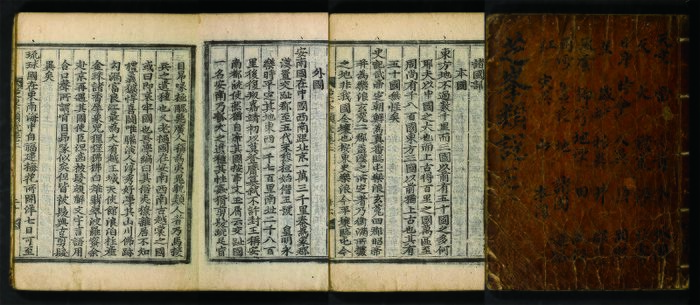 |
Title | |
| English | ||
| Chinese | 芝峯類說 | |
| Korean(RR) | 지봉유설(Jibongyuseol) | |
| Text Details | ||
| Genre | Literati Writings | |
| Type | ||
| Author(s) | 李睟光 | |
| Year | ||
| Source | ||
| Key Concepts | ||
| Translation Info | ||
| Translator(s) | Participants of 2018 Summer Hanmun Workshop (Advanced Translation Group) | |
| Editor(s) | ||
| Year | 2018 | |
Introduction
自賣 was a prevalent method for the impoverished commoners to obtain subsistence in the extreme situation of famine during the late Choson period. This was called 口活’
한성부 향도꾼은 동내 주민 중심의 인적 구성을 벗어나 이웃 동내, 나아가 한성부 전체를 지역적 기반으로 하는 대형 조직으로 변모하였다 했다. 또한 노비의 입계를 허락하지 않는 가문은 계원들 다수가 그 집에 쳐들어가 쌍욕을 해대는가 하면 그 집 처녀를 보쌈을 해와 형제들끼리 나누어 가질 정도였다. 이같은 무리한 행위에도 불구하도 계원의 세력이 너무나 강해 항의조차 못할 정도였다. 향도계 계원들의 숫자는 많은 경우 수 백명에 달했고 적은 계일지라도 100 여명에 이르렀다.
첫째, 그들의 상전 등 주위 양반들과 경제적 이해관계가 직접적이지 않았기 때문이었다. 주의 상전이나 양반들의 논밭을 경작하는 노비, 또는 하층민이라면 감히 토지소유주의 이해에 반하는 행위를 하지 못했을 것이다. 둘째, 익명성이 보장되고 회합이 용이한 도회지에서 활동했다는 점이다. 17세기 중엽 서울은 인구가 많을 뿐 아니라 유동 인구, 특히 도망 노비, 소작인들이 대거 이동함으로써 향도계원의 불법 혹은 도덕적 비난으로부터 일정부분 익명성을 보장받을 수 있었던 것이다.
connection with 중인.
